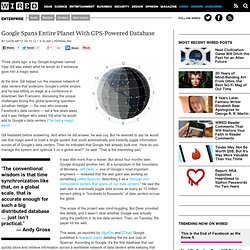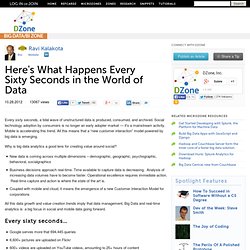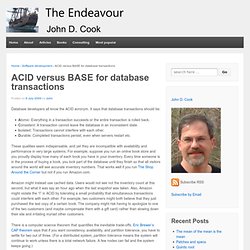

Google Spans Entire Planet With GPS-Powered Database. Three years ago, a top Google engineer named Vijay Gill was asked what he would do if someone gave him a magic wand.

At the time, Gill helped run the massive network of data centers that underpins Google’s online empire, and he was sitting on stage at a conference in downtown San Francisco, discussing the unique challenges facing this globe-spanning operation. Jonathan Heiliger — the man who oversaw Facebook’s data centers — sat a few seats away, and it was Heiliger who asked Gill what he would add to Google’s data centers if he had a magic wand. Gill hesitated before answering. And when he did answer, he was coy. But he seemed to say he would use that magic wand to build a single system that could automatically and instantly juggle information across all of Google’s data centers.
‘The conventional wisdom is that time synchronization like that, on a global scale, that is accurate enough for such a big distributed database … just isn’t practical.’ — Andy Gross. Here's What Happens Every Sixty Seconds in the World of Data. Every sixty seconds, a tidal wave of unstructured data is produced, consumed, and archived.

Social technology adoption by consumers is no longer an early adopter market — it’s a mainstream activity. Mobile is accelerating this trend. All this means that a “new customer interaction” model powered by big data is emerging. Why is big data analytics a good lens for creating value around social? New data is coming across multiple dimensions – demographic, geographic, psychographic, behavioral, socialgraphicsBusiness decisions approach real-time. All this data growth and value creation trends imply that data management, Big Data and real-time analytics is a big focus in social and mobile data going forward.
Every sixty seconds… Source: go-globe.com Mobile + Social = Mobile Social Networking The move to mobile computing and the rise of social networking are the two defining trends in computing right now. Social networks are going mobile in a big way. Mobile growth is not a new trend. ACID versus BASE for database transactions. Database developers all know the ACID acronym.

It says that database transactions should be: Atomic: Everything in a transaction succeeds or the entire transaction is rolled back.Consistent: A transaction cannot leave the database in an inconsistent state.Isolated: Transactions cannot interfere with each other.Durable: Completed transactions persist, even when servers restart etc. These qualities seem indispensable, and yet they are incompatible with availability and performance in very large systems. For example, suppose you run an online book store and you proudly display how many of each book you have in your inventory. Every time someone is in the process of buying a book, you lock part of the database until they finish so that all visitors around the world will see accurate inventory numbers.
Amazon might instead use cached data. There is a computer science theorem that quantifies the inevitable trade-offs. An alternative to ACID is BASE: Fallacies of Distributed Computing. The Fallacies of Distributed Computing are a set of assumptions that L.

Peter Deutsch and others at Sun Microsystems (now Oracle Corporation) originally asserted programmers new to distributed applications invariably make. These assumptions ultimately prove false, resulting either in the failure of the system, a substantial reduction in system scope, or in large, unplanned expenses required to redesign the system to meet its original goals. [citation needed] The fallacies[edit] The fallacies are summarized below:[1] Effects of the fallacies[edit] History[edit] See also[edit] References[edit] External links[edit]